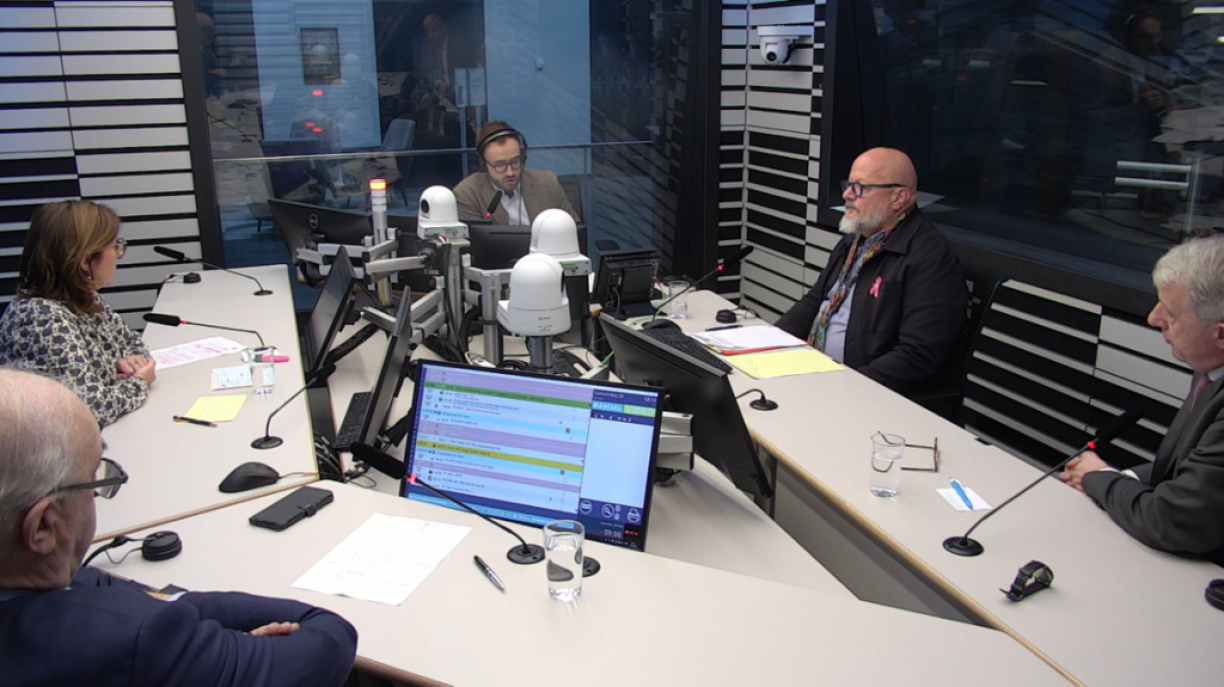
On Saturday, Luxembourg MEPs Tilly Metz, Marc Angel, Charles Goerens, and Fernand Kartheiser participated in a roundtable discussion on RTL Radio, where they offered sharp criticism of European Commission President Ursula von der Leyen and the composition of her new commission.
Charles Goerens of the Democratic Party (DP), Tilly Metz of the Green Party (Déi Gréng), and Marc Angel of the Luxembourg Socialist Workers’ Party (LSAP) each expressed regret over their previous votes in support of von der Leyen. While acknowledging her leadership qualities, they criticised her approach to governance, describing it as an attempt to assert her authority and “pull the strings.”
Marc Angel highlighted that von der Leyen disregarded the lead candidate principle and fragmented the commissioners’ portfolios, creating confusion over roles and responsibilities. He suggested this was a deliberate strategy to centralise decision-making with the Commission President.
Tilly Metz conveyed disappointment that neither “green” nor “social” priorities were visibly represented in the titles of the commissioners, warning that this omission could signal a shift toward national interests at a time when stronger European unity is needed. Both Metz and Angel condemned the appointment of the far-right Raffaele Fitto, a member of Giorgia Meloni’s post-fascist “Brothers of Italy” party, as a Vice-Commissioner, describing the decision as “a complete no-go.”
Fernand Kartheiser of the Alternative Democratic Reform Party (ADR) argued that the primary concern of the Greens, Social Democrats, and some Neoliberals is a potential shift in coalition dynamics that could place them in opposition.
Addressing the ongoing conflicts in the Middle East and Ukraine, MEP Charles Goerens, a 30-year veteran of the European Parliament, described the current era as “very difficult times” with the potential for further deterioration. He attributed these challenges to past failures, noting that the Israeli government under Prime Minister Netanyahu disregarded European Union guidance, while the United States has historically held the primary influence in the region.
Goerens argued that the EU missed an opportunity to strengthen stability in the Middle East by not forming a coalition with the US and select Arab League nations he described as “sensible,” which, he believes, could have bolstered responsible leadership on both the Palestinian and Israeli sides. However, he also pointed out that, due to the European Parliament’s requirement for unanimity, passing a resolution remains unfeasible.
On the subject of Ukraine, Green Party MEP Tilly Metz underscored that the EU’s continued support for Ukraine, including military aid, is “evident.” She acknowledged the importance of pursuing a diplomatic solution but cautioned that it is not an easy path.
In contrast, ADR MEP Fernand Kartheiser argued that diplomacy is the only viable resolution to both conflicts. Addressing concerns raised by some, including German intelligence, about a potential future Russian threat to NATO territory, Kartheiser said he does not consider this a likely risk. While he emphasised that he is “not naïve,” he believes progress can only be achieved through dialogue.
The roundtable discussion also addressed migration and measures to prevent illegal migration and manage cases of individuals who remain in the EU despite being denied asylum. ADR MEP Fernand Kartheiser noted that while the number of illegal migrants has decreased, it remains “extremely high.” Although his party does not advocate for turning Europe into a “fortress,” he emphasised the need to curb irregular migration.
On the other hand, MEP Marc Angel criticised German Chancellor Olaf Scholz’s remarks on border control at the recent EU summit, calling them “outrageous” and suggesting that Scholz is letting far-right parties influence his stance, which Angel described as “the wrong direction to take.” Instead of allocating funds to walls and barbed wire, Angel argued, resources should be directed toward integration policies and supporting people.
Charles Goerens expressed similar concerns about the growing influence of far-right narratives, highlighting that international maritime law mandates aiding those in distress at sea.
The discussion also touched on the topic of using Luxembourgish in the European Parliament, following Kartheiser’s recent attempt to speak the language in a plenary session. Kartheiser suggested that, in the future, Luxembourgish might be included by submitting a written text in advance for translation.
However, Marc Angel raised concerns, noting that it would be difficult to ensure the spoken words match the pre-submitted text.
Charles Goerens pointed out the complexity of the issue, explaining that interpreters would need to verify alignment between the written and spoken content. To implement this, an interpreter fluent in Luxembourgish would need to be available in every booth that provides interpretation into one of 23 languages.